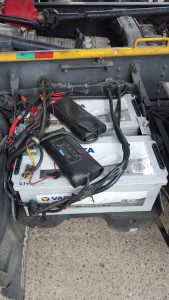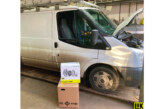Battery life on a commercial vehicle, and throughout a fleet, can have a significant impact on the amount of downtime that it goes through. Rotronics explains the issues its customers have been experiencing during the first year of operation and offers a battery management solution.
The Rotronics team is increasingly being asked to assist fleets throughout the UK to help solve battery management issues in vehicles that are well under 12-months old and were purchased new from manufacturers.
Rotronics is the UK partner for CTEK and Midtronics battery management technology and specialises in battery management programmes. The company has recently been working alongside fleet teams with brand new vehicles that are experiencing battery issues within the first 12 months.
Rotronics’ Managing Director, Ken Clark, explains: “Customers are coming to us because they are seeing that batteries are failing within the first 12 months, within the warranty period, but don’t know why.
 “This is quite a new area for our business and we think that it is because fleet owners/managers now realise how important it is to maintain the health of their fleet batteries. Battery management is now far further up their workshop maintenance agenda than it was two years ago. It is fantastic to see that knowledge and awareness of batteries has greatly increased amongst professional workshop teams. These issues have probably gone on for years, however Fleet Managers now know that they can do something positive to rectify the situation, rather than keep replacing batteries. That starts to get very expensive.”
“This is quite a new area for our business and we think that it is because fleet owners/managers now realise how important it is to maintain the health of their fleet batteries. Battery management is now far further up their workshop maintenance agenda than it was two years ago. It is fantastic to see that knowledge and awareness of batteries has greatly increased amongst professional workshop teams. These issues have probably gone on for years, however Fleet Managers now know that they can do something positive to rectify the situation, rather than keep replacing batteries. That starts to get very expensive.”
Best practice
Looking at the test and charge practices is always first on the agenda, and that involves analysing the workshop’s attitude to a sustained programme of testing and charging, i.e. do they take it seriously or not?
Ken says: “Workshops using our Battery Management Programme, who have put numerous chargers around the inspection/service pit areas, see the best results. They charge the vehicles at every opportunity and batteries are tested every 4 to 6 weeks. These workshops have experienced impressive improvements and have managed to cut non-starts by up to 75%. This activity becomes part of the routine service inspection and takes a few seconds to save considerable time and money in the future.”
The second part of the process is to look at what condition the batteries have been held in prior to delivery to the end user or customer. Ken Clark and his team piece together some facts to see how well the batteries were maintained by the body builder or the supplying dealer, and work out how the batteries perform under cyclic conditions during vehicle use.
Ken says: “There is an assumption that batteries are well looked after and maintained, but that might not be the case. This becomes all too apparent when you see a vehicle transporter delivering new vehicles that require a jump start to simply get them off the trailer to deliver them.
Vehicle footprint
A vital part of the diagnostic process, to understand why batteries are failing within 12 months, is to look at a vehicle’s footprint and potentially apply data loggers to the fleet.
Ken says: “We look at the likely drains to the electrical load, the general vehicle usage in a day/week/month, analyse what the likely demands of the vehicle are, usage patterns and the drive cycle and what maintenance patterns the workshop has adopted.
 “Sometimes the fault can be with the driver, the workshop maintenance team or the application and fitness of purpose of the batteries for the application of the vehicle. Very often, it is a combination of issues and our team is increasingly helping Fleet Managers get to the bottom of these very expensive problems.
“Sometimes the fault can be with the driver, the workshop maintenance team or the application and fitness of purpose of the batteries for the application of the vehicle. Very often, it is a combination of issues and our team is increasingly helping Fleet Managers get to the bottom of these very expensive problems.
“We are helping a number of national fleet customers by placing data loggers on the vehicles to track the drive cycles over a period of time. That enables us to understand what charge current is going back into the vehicle, via the charging system or the drive cycle. From this we can calculate if there is a negative impact on the overall performance of the battery to keep up with the vehicle demands that impact on the life cycle of a battery.”
Work is underway to help advise the fleet operators on how to assist both workshop engineers and drivers to reduce the drains on the batteries. The Rotronics team is happy to work in consultation with a fleet’s technical development and workshop teams to advise about the preferred options in how both battery specification and performance can be optimised.










